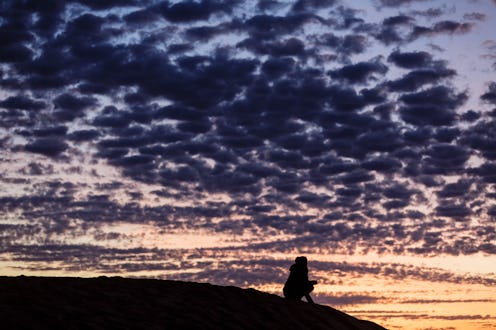Life
If You’re Anxious About Climate Change, Experts Say This Can Help

If you’ve been feeling mounting anxiety about global warming and climate change in recent years, you’re not alone. Extreme weather changes and natural disasters can contribute to climate change anxiety — whether you’re directly affected by these events or not. Unfortunately, fears about climate change are not unfounded. Increasingly extreme weather patterns, mass destruction of coral reefs, species extinction, wildfires, and severe, global food shortages are possible as soon as 2040, Coral Davenport wrote for The New York Times in 2018. While the potential for a global climate crisis is real, mental health experts say that there are things you can do to help manage your fears.
"Whether you’ve lived through extreme weather conditions, natural disasters, or witnessed or read something on the news, feelings about these past events (if left unprocessed) can worsen current perceptions, feelings, and thoughts," Erica Curtis, a licensed family and marriage therapist based in California, tells Bustle.
“Anything in the unknown can cause us to feel scared,” Celeste Viciere, LMHC, author and host of the Celeste the Therapist podcast, tells Bustle. “There are so many questions around climate change that we don’t understand, but we can see that things are not normal. With climate change, and other things in the unknown that may cause your anxiety to spin out of control, it’s important to ground yourself. It’s easy for our brain to worry about the 'what-ifs' of the future. We have to be intentional in reminding ourselves that, right now, we are here on earth, and while you can have an impact, you alone cannot make it go away.”
Climate change can pose a number of risks to mental health, a 2018 study published in Nature: The International Journal of Science says. Feeling grief associated with the loss of species and ecosystems, in addition to fears about what the future might bring, means that "ecological grief" is a real and valid response to loss — and it “may become more common as climate impacts worsen,” the study’s authors say in the paper’s abstract.
Climate change anxiety is characterized by a heightened sense of fear related to the possible effects of climate change, Bustle writer Rebecca Fearn wrote in a previous report. The symptoms of climate-related anxiety, or eco-anxiety, are similar to other types of anxiety, wrote Fearn, and can include insomnia, depression, and panic attacks.
A major report by the American Psychological Association (APA) released in 2017 shows that the mental health effects of climate change tend to have the most impact in two distinct ways. There’s the trauma you might experience if you’ve gone through a natural disaster firsthand — meaning that you’ve had direct experience with climate-related crisis. Also, many people may have fear around how climate change and global warming will impact the world on a global scale, and what this means for the future, the report says.
"The impacts of climate change on people’s physical, mental, and community health arise directly and indirectly," the study’s authors state in the report. "Some human health effects stem directly from natural disasters exacerbated by climate change, like floods, storms, wildfires, and heatwaves. Other effects surface more gradually from changing temperatures and rising sea levels that cause forced migration."
When climate-related fears arise, it’s important to be mindful of your thought patterns, Viciere says. “Pay attention to your thoughts to have a grasp on what you are thinking. Most times we tend to put everything in a negative spin. Work on reframing those thoughts to remind yourself that you are OK now. Journaling can also be a good way to write down how you’re feeling while looking at your thought patterns to see what triggers are causing you to become anxious. It’s helpful to educate yourself to see if there is anything you can do, within reason, to be part of the solution."
"Sometimes we have so many fears that we avoid looking at information," Viciere says. "Also, before researching, make sure you are looking at a reputable site. Anyone can write anything on the internet now. If you’re finding yourself obsessing over the information you find, limit the time you spend reading about it. Constantly feeding your brain with information, coupled with your anxiety, can cause you to obsess over [your fears]."
If climate change-related anxiety is affecting your day-to-day life, or disrupting your sleep, it might be helpful to reach out for support. Working with a therapist might help you find new ways to manage your fears as you do what you can, in your individual way, to contribute to positive solutions moving forward. "Consider an achievable future and do one small thing today to help make that future a reality," Curtis says. "Ride your bike to work or school. Limit plastic use. Support companies that support your ideals. You don’t have to deny the facts, nor do you need to be blindly optimistic that everything will be fine."
Climate change, unfortunately, is a reality for our generation. But the more people can channel their feelings into action, the more a solution is in sight.